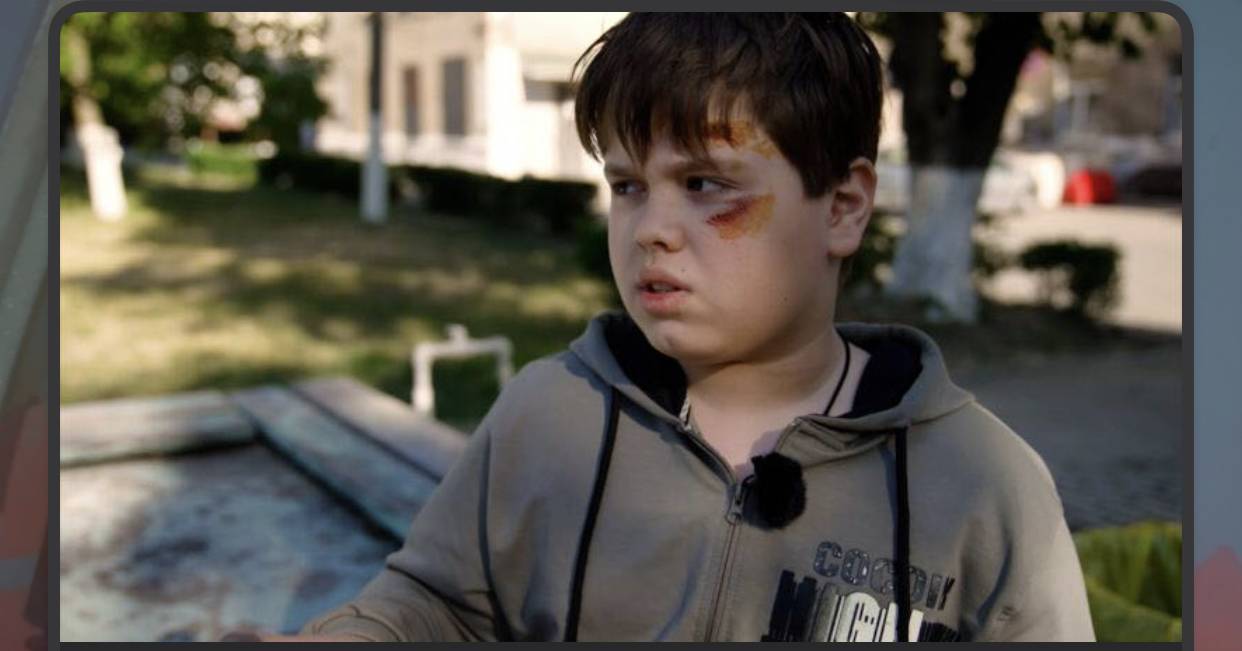But as the 10-year-old younger son of Larisa and Mykola Glushko staggered in the dark, toward his mother’s room, he realized he was awake, and that his mother lay before him, crushed beneath a collapsed concrete baton.
“Something fell,” he recalled. “Mom was saying, ‘Kolya, Kolya.’ I shouted, ‘Mom, I’m alive.’”
He said he frantically scraped the dust from his face and eyes. “I saw my Mom crushed down by the ceiling. I tried to pull it away, but I couldn’t. Mom was moaning and shaking her legs. And I was shouting, ‘Mother, mother, it’s just a dream, a horrible dream.’” Mykola had a similar nightmare days earlier, and felt it might be recurring. “Then there was darkness.”
His mother died in front of him. His father was killed by the initial explosion. Hours earlier, the family had a barbecue, and Mykola senior drank one beer too many and talked passionately about enlisting. In the pitch black, his son clambered outside, the front of their comfortable family home beyond recognition, its gates torn clean away.
For Mykola, the act of survival stretches what any 10-year-old could be expected to bear. His loss, part of a patina of suffering across Ukraine’s two years of war, where Russian missiles that slammed inexplicably into civilian targets, claim lives that do not make the headlines, and unravel childhoods in ways that will echo for decades in Ukraine.
Mykola was given a shot of medicine to calm him in hospital, and his brother came to explain what had happened. “He told me now it’s only me and him left. He repeated it four times. I was trying to calm myself down, but also hated myself. Because I couldn’t save my mom.”
He has spoken with his new guardian, his godmother, who lives nearby, and is clear he will stay in the military town of Pokrovsk to tend their graves. “I will visit them,” he said. “(I will) apologize for not able to save them. Will apologize to my father that I couldn’t save my mom, his wife.”
He said his dream now is different, to ask his parents important questions. “What should I do now? How do I live? Another dream is to take revenge on the one who launched the missile.”
Across the eastern frontline, notably around Pokrovsk, the pace of Russia’s advance appears to quicken, and with it the unspeakable loss of families like Mykola’s. At the ruins of his home, neighbors said there is no military target nearby. Workers sifted through the dust. The smell of the decaying family dog lingered. On a nearby radio, Russians are so close their stations were audible, explaining to their audience how the West refuses to give Ukraine modern equipment and so “the ordinary boys from Ukrainian armed forces will be the ones to suck it up.”
A short drive away, at a stabilization point in an eastern town, the life-changing hideousness of even light injuries wasapparent. Sunset means frontline units can begin the task of evacuating their wounded, safe from the Russian attack drones that haunt daylight hours.
The medical point waited in complete darkness, and a car raced out from the night. Two wounded soldiers from Klishchiivka – a town where Moscow has recently claimed success, partially owing to Ukraine having to relocate forces from there to defend against the onslaught in Kharkiv region – emerged from the car. One has his head fully bandaged up and talked, his arms outstretched, as groped his way forward. The other was laid flat on a gurney.
They were quickly tended to. Clothes were gently cut away. One had damage to his eyes, swollen shut, yet appearedotherwise less badly hurt. The other had shrapnel in his leg, flesh injuries to his arm, and was peppered with shrapnel on his back. His face was covered with dirt and his eyes also struggled to open.
A mortar landed about four feet (1.2 meters) from their dugout. It is a matter of luck and a few feet that they are still physically intact. The staff swiftly tried to clean their eyes.
“When I open the eye like this, do you see the light?” a doctor asked. “What about people?” The patient could only see light. A nurse noticed damage to his right hand. They examined his back and saw a morass of tiny wounds. Suddenly, the patient worsened. “Something on my side,” he screamed.
It is possible the force of the blast caused internal injuries. The doctors moved to quickly intervene. Anaesthetic was injected into his lung, and a tube inserted. “Cough, and it will get better,” a doctor told the patient.
Around the pair, there were four empty beds. A year ago, one doctor, Ivan, told us, they could have 250 patients a day, when the Russian assault on Bakhmut was at its peak. Yet the drop in patients does not herald an improvement in Ukraine’s war. The 93rd mechanized brigade lacks infantry, and finds it hard to resupply and position them on the frontline because of the threat of Russian drones, an official told us, and so this stabilization unit lacks patients. It is a chilling reminder of the manpower shortage Kyiv is dealing with after two years of war.
The patients were led to a waiting ambulance, which left in the pitch black, its headlights off. Russia has targeted medical facilities before.




No comments yet
Be the first to share your thoughts!